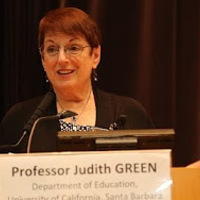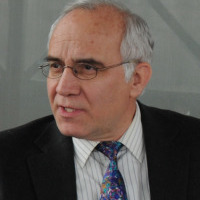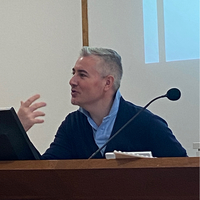Papers by Kamaludin Kamaludin

Journal of English Education Forum, Mar 31, 2024
Translanguaging is the practice of changing the usage of two different languages or more in order... more Translanguaging is the practice of changing the usage of two different languages or more in order to improve communication and enrich the linguistic aspects of language use. This study presents the use of translanguaging in EFL classroom by English teachers. The main aim of this study is to describe the components and the functions of translanguaging used by the English teachers at MTsN 1 Mataram during teaching and learning process. The subject of this study consisted of two English teachers who teach at MTsN 1 Mataram. The results of this study show that there are two components and six functions of translanguaging used by the English teachers. The translanguaging's components used by the English teachers were dominated by 58% codeswitching, and 42% translating and interpreting. The difference between translanguaging and code switching is in the concept. Translanguaging allows anyone to use more than two languages without constraints, yet code-switching has its own limitations. In addition, the highest frequency of translanguaging functions is message qualification which occurred 30 times or 31%. Meanwhile, the lowest frequencies are quotations, and personalization vs objectification, where each of these functions contains one data. The implications of translanguaging in education are vast and can have a positive impact on various aspects of teaching and learning.

Penggunaan bahasa kelas (Classroom Language) dalam proses pembelajaran bahasa Inggris sangatlah p... more Penggunaan bahasa kelas (Classroom Language) dalam proses pembelajaran bahasa Inggris sangatlah penting agar siswa terbiasa berkomunikasi dan berinteraksi dengan guru dan siswa lainnya di kelas secara lisan dan tulisan. Namun hanya sedikit guru bahasa Inggris yang bisa menggunakan bahasa kelas dengan efektif. Berdasarkan hal tersebut kegiatan pengabdian pada masyarakat bertujuan: 1) Untuk meningkatkan kemampuan penggunaan Classroom Language guru-guru Bahasa Inggris dan non-bahasa Inggris; 2) memecahkan salah satu permasalahan utama yang dihadapi guru-guru bahasa Inggris terkaiti rendahnya motivasi dan kemampuan siswa dalam berkomunikasi dan berinteraksi dalm bahasa Inggris; dan 3) mengembangkan kerjasama antara Program Studi Pendidikan Bahasa Inggris FKIP UNRAM dengan pemangku kepentingan terutama guru-guru bahasa Inggris di lingkungan MAN Lombok Barat. Metode yang digunakan dalam kegiatan pengabdian ini adalah dengan presentasi untuk menyampaikan informasi tentang penggunaan Classroom Language di kelas, pemberian model, dan praktik atau latihan terbimbing dan mandiri. Jumlah peserta kegiatan yaitu 30 orang guru di lingkungan MAN Lombok Barat. Berdasarkan hasil pretest, posttest, dan observasi praktek mengajar, hasil kegiatan ini menunjukkan ada peningkatan yang signifikan dari segi pengetahuan dan keterampilan guru-guru peserta pelatihan dalam menggunakan Classroom Language. Karena Classroom Language ini juga sangat bermanfaat sebagai input bahasa Inggris bagi siswa di dalam kelas, guru sebaiknya tetap konsisten dalam menggunakannya.
Proceedings of the 3rd Annual Conference of Education and Social Sciences (ACCESS 2021), Dec 8, 2022
The study discusses social structures, language varieties and cultural processes in guest-welcomi... more The study discusses social structures, language varieties and cultural processes in guest-welcoming praxis called "penyilaqan" [process of inviting other people in the community to visit someone's house]. Ethnographic observation and interview were the primary means of data collection and the data were analyzed using ethnographic and content analysis. The study found that social status that the inviters and the invitees possess within the social structure determines the language varieties selected for enacting the cultural encounters and it also elucidates how the varieties differ from one structure to another.

Proceedings of the 3rd Annual Conference of Education and Social Sciences (ACCESS 2021), Dec 8, 2022
The relationship between language and culture has long been an interesting object of study in the... more The relationship between language and culture has long been an interesting object of study in the field of sociolinguistics. On one hand, culture is said to be shaped by language. On the other hand, language is stated to be constructed by culture. According to Sapir (1921), as a capability that man acquires by being a member of society, one might say that language is actually a part of culture. By this definition, hence, the nature of relationship between culture and other elements of language is self-explanatory; the elements-just like the overall language-are supposedly also interrelated to culture. Considering Sapir-Wholf's Hypothesis of linguistic relativity-this paper aims to explore the nature of relationship between culture and an element of language, namely, swear words. The analysis of data obtained through questionnaire and observation discovers different reactions to swear words of various languages from people of different cultural backgrounds. The findings eventually lead to the conclusion that culture is mainly responsible for the construction of profanities in different languages. In light of the findings, the Sapir-Wholf's Hypothesis is re-evaluated.

Kegiatan pengabdian ini ditujukan untuk: (1) meningkatkan kompetensi pedagogis guru dan motivasi ... more Kegiatan pengabdian ini ditujukan untuk: (1) meningkatkan kompetensi pedagogis guru dan motivasi belajar Bahasa Inggris siswa-siswi MAN Lombok Barat, (2) membangun kesadaran guru akan pentingnya interaksi dan komunikasi dalam pembelajaran Bahasa Inggris, (3) memotivasi guru untuk merencanakan program pembelajaran Bahasa Inggris interaktif dan komunikatif secara mandiri, dan (4) membantu guru merencanakan dan menggunakan sumber belajar yang ada di sekitar mereka sebagai media untuk pembelajaran Bahasa Inggris yang komunikatif dan menyenangkan. Dari survei awal pada siswa-siswa SMP, SMA, SMK, dan MA se-Pulau Lombok dalam penelitian kami sebelumnya (Yusra, 2018) menemukan bahwa guru-guru Bahasa Inggris kesulitan menemukan bahan ajar yang dapat dikembangkan sebagai bahan ajar yang menyenangkan bagi siswa serta mereka kesulitan mengenmbangkan Lembar Kerja Siswa (LKS) yang dapat memfasiltasi interaksi dua arah antara siswa dengan siswa lainnya. Yusra (2022) menyurvei pembelajaran Bahasa Inggris di dunia dan di Indonesia selama COVID-19 dan menemukan bahwa mayoritas guru menggunakan teknik kuliah sebagai strategi mengajar dan strategi ini dirasakan sangat membosankan bagi siswa. Faktor penyebab utama masalah ini adalah tidak adanya interaksi antarsiswa karena kurangnya repertoire strategi mengajar sebagai stok pilihan yang dapat dipergunakan guru agar siswa berinteraksi secara komunikatif selama pembelajaran. Yusra (2015) menemukan bahwa mayoritas guru bahasa Inggris di NTB mengalami kesulitan dalam mengajarkan teks-teks explanation, discussion, dan argument sehingga perlu diberikan penyegaran. Hal ini juga terjadi pada guruguru bahasa Inggris di MAN se-Kabupaten Lombok Barat. Kegiatan yang ditawarkan untuk mengatasi masalah ini adalah pembekalan bagi guru-guru tersebut dengan pembelajaran Bahasa Inggris secara interaktif komunikatif melalui pengembangan bahan ajar berbentuk info-gap dan permainan bahasa terintegrasi dengan model pembelajaran abad 21 dengan mengedepankan pembelajaran berbasis HOTS. Dalam kegiatan ini tim PKM memperkenalkan LKS, permainan bahasa, kegiatan komunikasi, dan kegiatan pembelajaran lainnya yang efektif dan menyenangkan dan melibatkan unsur menganalisis (C4), mengevaluasi (C5) dan mengkreasikan teks secara tepat sesuai konteks (budaya dan situasi). Kegiatan ini akan melibatkan 30 orang guru Bahasa Inggris di Madrasah Aliyah (MA) se-Kabupaten Lombok Barat dan bekerjasama dengan MGMP Bahasa Inggris Kabupaten Lombok Barat. Luaran kegiatan ini adalah artikel ilmiah dari kegiatan pengabdian ini, skripsi, tesis dan artikel ilmiah karya mahasiswa yang

Prosiding Konferensi Linguistik Tahunan Atma Jaya (KOLITA)
This paper aims at examining social functions, schematic structure, transitivity, and modality in... more This paper aims at examining social functions, schematic structure, transitivity, and modality in narrative texts in an English textbook published by the Indonesian government and used at the tenth grade English classes. Three narrative texts were found in the textbook and selected as samples. Hallidayan concepts of social functions, schematic structure, transitivity and modality were used as theoretical epistemological concepts and his lexico-grammatical analytical framework was used as a methodological procedure of data analysis. Clauses in the three texts (i.e., Issumboshi, The Legend of Malin Kundang, and Strong Wind) were coded by numbering them and analyzed in a series of systemic functional linguistic analyses: Theme-Rheme, process-type analysis, mood-residue analysis, and functional analysis. The texts display this schematic pattern: orientation^evaluation^compilcation^resolution. The absence of reorientation within the generic structure implies the written nature of the tex...

Multilingua, Jul 19, 2022
English has been for centuries seen as the native language of speakers in the English-speaking in... more English has been for centuries seen as the native language of speakers in the English-speaking inner circle countries, as the second language of speakers in the former British-colony outer circle countries and as an international business lingua franca among speakers in the techno-economically powerful extended circle countries. Little is known how speakers in the Expanding Circle countries where English is learned as an additional foreign language make use of the language in everyday life, for communication, and for business purposes. This article fills the gap by examining how and why English and English structures have been used in shop naming in the Expanding Circle. Surveying and observing shop names, products on sale, and neighborhood’s socio-economic conditions, the study identifies possible connection between the nature of the language used, the types of products being sold and the socioeconomic nature of the neighborhood. Distributing questionnaires and interviewing shop owners, staff and buyers in the central business districts on Lombok Island, Indonesia, the study establishes linguistic ideology and socio-economic and cultural expectation behind the name selection. Three clusters of CBDs were observed: urban, suburban and tourism areas. With Chi-square analyses, the study establishes a strong relationship between the choice of language for shop names and the types of products on sale irrespective of the socio-economic conditions of the shop neighborhood. With linguistic analyses, the study shows that the choice of names in English or in English-like structures is affected by the ideology of English as the language of science, technology and modern lifestyle. English is strongly associated with modern lifestyle and the majority of lifestyle, entertainment and fashion shops are named in the English language. English-like structures are connected to English as the language of technology and shops dealing with electricity and machinery technologies are named in English-like structures. The use of these linguistic ideologies is expected to boost the image of the shops and the sale of the products and this expectation was statistically verified.

Asian EFL Journal, Mar 1, 2018
Spiritual and social attitudes, scientific knowledge, and language-related life skills have been ... more Spiritual and social attitudes, scientific knowledge, and language-related life skills have been the main outcomes of learning in Indonesian education system particularly when the 2013 curriculum is implemented nation-wide. Although spiritual and social attitudes have been respectively assigned to the targets of Religion and Civics Education, the roles of teachers as agents of changes within their community enforce them to take wider and more overarching roles educating learners with attitude, knowledge and skills and leave their traditional roles as providers of knowledge and trainers of skills. The study investigates how English teachers exercise these agentic roles in lesson planning and materials development. Nine experienced professional English teachers (i.e. 3 SMP, 3 SMA, 3 SMK) and their lesson plans were purposively selected as samples. Analyzing the lesson plans and learning materials, the study found that knowledge and skills in the lessons were planned to be associated with particular spiritual and social attitudes. The study found that faithfulness and piety in the students' respective religions were the most dominant spiritual attitudes in teachers' concern. Self-confidence, discipline, respect, caring, and responsibility were the most dominant social attitudes. These attitudes were strategically planned and integrated, through games, group discussions and other two-way interactive materials, with students' knowledge of facts, concepts, procedures and meta-cognition and skills obtained from their intellectual potentials, knowledge-based competency, learning and working experiences and relevant cultural practices. Analyzing interview data, the study explicates how the attitudes will be integrated into lesson implementation and how they are integrated with the types of knowledge and skills above. Being explorative in nature, the study opens up a new way of looking into teacher's pedagogic role, that is, an agentic role motivated by the need to facilitate learners with attitudes, knowledge and skills relevant with job requirements and not by the urge to fulfill self-efficacy, curriculum target, or minimum standard of attainment.

Under the new Indonesian education paradigm, "guru penggerak" (mover teachers) and "merdeka belaj... more Under the new Indonesian education paradigm, "guru penggerak" (mover teachers) and "merdeka belajar" (freedom in learning), teachers, including English teachers, in Indonesia are given room to use teaching materials and strategies appropriate to students' condition and need. However, it is not clear how this paradigm is responded by English teachers given the lack of learning resources. This paper examines English teachers' responses to the new Indonesian education paradigm based on data obtained from a case study of Batu Layar English Teachers' Consultative Group (MGMP) in West Lombok involving twenty (20) teachers purposively selected as the sample of the study. The data were collected through observing teachers' activities in the MGMP meetings, interviewing them on how they respond to the new education paradigm and collecting teaching and learning related documents. The results show that students and pedagogical factors influence the teachers to positively and negatively respond to the new education paradigm.

Spiritual and social attitudes, scientific knowledge, and language-related life skills have been ... more Spiritual and social attitudes, scientific knowledge, and language-related life skills have been the main outcomes of learning in Indonesian education system particularly when the 2013 curriculum is implemented nation-wide. Although spiritual and social attitudes have been respectively assigned to the targets of Religion and Civics Education, the roles of teachers as agents of changes within their community enforce them to take wider and more overarching roles educating learners with attitude, knowledge and skills and leave their traditional roles as providers of knowledge and trainers of skills. The study investigates how English teachers exercise these agentic roles in lesson planning and materials development. Nine experienced professional English teachers (i.e. 3 SMP, 3 SMA, 3 SMK) and their lesson plans were purposively selected as samples. Analyzing the lesson plans and learning materials, the study found that knowledge and skills in the lessons were planned to be associated with particular spiritual and social attitudes. The study found that faithfulness and piety in the students' respective religions were the most dominant spiritual attitudes in teachers' concern. Self-confidence, discipline, respect, caring, and responsibility were the most dominant social attitudes. These attitudes were strategically planned and integrated, through games, group discussions and other two-way interactive materials, with students' knowledge of facts, concepts, procedures and meta-cognition and skills obtained from their intellectual potentials, knowledge-based competency, learning and working experiences and relevant cultural practices. Analyzing interview data, the study explicates how the attitudes will be integrated into lesson implementation and how they are integrated with the types of knowledge and skills above. Being explorative in nature, the study opens up a new way of looking into teacher's pedagogic role, that is, an agentic role motivated by the need to facilitate learners with attitudes, knowledge and skills relevant with job requirements and not by the urge to fulfill self-efficacy, curriculum target, or minimum standard of attainment.

Antropologi Indonesia (Edisi On-Line), Nov 22, 2013
This study is aimed at identifying linguistic features, indexing ethnic identities, and inter-eth... more This study is aimed at identifying linguistic features, indexing ethnic identities, and inter-ethnic solidarity in transmigration contexts. Data were collected through interview, documentation and ethnography of various transmigrate communities on Sumbawa island. The data were then analyzed qualitatively with the ethnography of speaking and interaction analysis. The study found that (a) Ethnic identities in the migrant areas can be linguistically identified in four forms: orang aida (to refer to Sumbawa people), orang kalembo ade (for Bima people), dengan batur (for Sasak people) and orang beli (Balinese people). (b) These people were identifiable in the way they articulate particular sounds: orang beli (the Balinese) were identified in terms of dominant use of alveolar retroflexed, orang batur (the Sasak) were identified in the way they marked use of alveolar retroflexed, and orang kalembo ade (the Bima people) were identified through their articulation of closed central vowel as open low front vowel. It was also found that the forms had been used to construct ethnicity and interethnic solidarity between participants. The use of ana and ente in interaction indicated solidarity regardless of differences in age and social status. Key words: language and society, contextualization, ethnicity, solidarity, inter-cultural communication, transmigration

Toursim has become a global business that it requires profesionals with globally accepted skills.... more Toursim has become a global business that it requires profesionals with globally accepted skills. Provision of such skills has been one of the major concerns of the ASEAN ministeries of tourism and in collaboration with the Australian government they have set up an agreement to train tourism workers in the same curriculum in order to attain ASEAN Common Competency Standards for Tourism Professionals (ACCSTP), the Common ASEAN Tourism Curriculum (CATC), and Regional Qualifications Framework and Skills Recognition System (RQFSRS). Out of six tourism sectors, housekeeping has been selected as the priority and all housekeeping-related English competencies have been collaboratively listed and tried out to tourism students in ASEAN countries. Studies at global-ASEAN and macro-national levels have reported that the trial was a great success and was suggested to be extended to other tourism sectors. However, studies at meso and micro levels have reported otherwise and a number of factors have hindered its success. This study contributes to this debate by explicating the views of the teachers and the students on the curriculum and their response to it when used in classroom.

Current Issues in Language Planning, Aug 11, 2021
Tourism is a service industry that demands well-trained professionals with internationally accred... more Tourism is a service industry that demands well-trained professionals with internationally accredited skills including English language proficiency. Meeting such demands has been one of the foremost concerns of the ASEAN ministries of tourism and education. In collaboration with ASEAN member countries and the Australian government, Indonesian Ministry of Education and Ministry of Tourism piloted the integration of the Common European Framework of Reference for Languages (CEFR), ASEAN Common Competency Standards for Tourism Professionals (ACCSTP), Common ASEAN Tourism Curriculum (CATC), Regional Qualifications Framework and Skills Recognition System (RQFSRS), and Indonesian Qualification Framework (IQF) into the National Curriculum (K-13) for hospitality and tourism education. Successfully trying out at hospitality and tourism colleges, the project was subsequently extended to vocational high schools. The study reported in this article investigated how the various policies were integrated by English teachers for their implementation in vocational high schools in a local Indonesian context and what outcomes and experiences resulted from this process. The article illustrates micro-level teacher agency in meeting regional, national and local policy mandates for preparing tourism and hospitality professionals for the common ASEAN job market.

JPPI (Jurnal Penelitian Pendidikan Indonesia), Jul 15, 2022
Teacher agency is generally accepted as a strategy that teachers employ to face educational chall... more Teacher agency is generally accepted as a strategy that teachers employ to face educational challenges. This article presents the result of a qualitative case study that examined learning difficulties that university students face during their study and prospects of exercising agency in facing the students' learning difficulties. The current study was conducted at a postgraduate English department in a government University in West Nusa Tenggara. The participants of this study include three students in their third semester in the academic year 2020/2021 and three university English teachers who were purposively selected. Being qualitative in nature, this study used in-depth interviews with the students to obtain data on their learning difficulties. In-depth interviews were also conducted to the university English teachers to collect data on prospects of exercising their agency in dealing with learning difficulties facing the students. The collected data were then analyzed using the following steps: identifying, classifying, describing, and explaining. Data analysis indicated that the students experienced difficulties in reading and writing. The results of the study also revealed prospects of teacher agency exercise in helping students cope with their learning difficulties as enabled by specific conditions related to teachers' pedagogical knowledge and teachers' collaborative cultures.

Multilingua
English has been for centuries seen as the native language of speakers in the English-speaking in... more English has been for centuries seen as the native language of speakers in the English-speaking inner circle countries, as the second language of speakers in the former British-colony outer circle countries and as an international business lingua franca among speakers in the techno-economically powerful extended circle countries. Little is known how speakers in the Expanding Circle countries where English is learned as an additional foreign language make use of the language in everyday life, for communication, and for business purposes. This article fills the gap by examining how and why English and English structures have been used in shop naming in the Expanding Circle. Surveying and observing shop names, products on sale, and neighborhood’s socio-economic conditions, the study identifies possible connection between the nature of the language used, the types of products being sold and the socioeconomic nature of the neighborhood. Distributing questionnaires and interviewing shop ow...

Toursim has become a global business that it requires profesionals with globally accepted skills.... more Toursim has become a global business that it requires profesionals with globally accepted skills. Provision of such skills has been one of the major concerns of the ASEAN ministeries of tourism and in collaboration with the Australian government they have set up an agreement to train tourism workers in the same curriculum in order to attain ASEAN Common Competency Standards for Tourism Professionals (ACCSTP), the Common ASEAN Tourism Curriculum (CATC), and Regional Qualifications Framework and Skills Recognition System (RQFSRS). Out of six tourism sectors, housekeeping has been selected as the priority and all housekeeping-related English competencies have been collaboratively listed and tried out to tourism students in ASEAN countries. Studies at global-ASEAN and macro-national levels have reported that the trial was a great success and was suggested to be extended to other tourism sectors. However, studies at meso and micro levels have reported otherwise and a number of factors ha...

Spiritual and social attitudes, scientific knowledge, and language-related life skills have been ... more Spiritual and social attitudes, scientific knowledge, and language-related life skills have been the main outcomes of learning in Indonesian education system particularly when the 2013 curriculum is implemented nation-wide. Although spiritual and social attitudes have been respectively assigned to the targets of Religion and Civics Education, the roles of teachers as agents of changes within their community enforce them to take wider and more overarching roles educating learners with attitude, knowledge and skills and leave their traditional roles as providers of knowledge and trainers of skills. The study investigates how English teachers exercise these agentic roles in lesson planning and materials development. Nine experienced professional English teachers (i.e. 3 SMP, 3 SMA, 3 SMK) and their lesson plans were purposively selected as samples. Analyzing the lesson plans and learning materials, the study found that knowledge and skills in the lessons were planned to be associated w...

Current Issues in Language Planning, 2021
Tourism is a service industry that demands well-trained professionals with internationally accred... more Tourism is a service industry that demands well-trained professionals with internationally accredited skills including English language proficiency. Meeting such demands has been one of the foremost concerns of the ASEAN ministries of tourism and education. In collaboration with ASEAN member countries and the Australian government, Indonesian Ministry of Education and Ministry of Tourism piloted the integration of the Common European Framework of Reference for Languages (CEFR), ASEAN Common Competency Standards for Tourism Professionals (ACCSTP), Common ASEAN Tourism Curriculum (CATC), Regional Qualifications Framework and Skills Recognition System (RQFSRS), and Indonesian Qualification Framework (IQF) into the National Curriculum (K-13) for hospitality and tourism education. Successfully trying out at hospitality and tourism colleges, the project was subsequently extended to vocational high schools. The study reported in this article investigated how the various policies were integrated by English teachers for their implementation in vocational high schools in a local Indonesian context and what outcomes and experiences resulted from this process. The article illustrates micro-level teacher agency in meeting regional, national and local policy mandates for preparing tourism and hospitality professionals for the common ASEAN job market.

Antropologi Indonesia, 2013
This study is aimed at identifying linguistic features, indexing ethnic identities, and inter-eth... more This study is aimed at identifying linguistic features, indexing ethnic identities, and inter-ethnic solidarity in transmigration contexts. Data were collected through interview, documentation and ethnography of various transmigrate communities on Sumbawa island. The data were then analyzed qualitatively with the ethnography of speaking and interaction analysis. The study found that (a) Ethnic identities in the migrant areas can be linguistically identified in four forms: orang aida (to refer to Sumbawa people), orang kalembo ade (for Bima people), dengan batur (for Sasak people) and orang beli (Balinese people). (b) These people were identifiable in the way they articulate particular sounds: orang beli (the Balinese) were identified in terms of dominant use of alveolar retroflexed, orang batur (the Sasak) were identified in the way they marked use of alveolar retroflexed, and orang kalembo ade (the Bima people) were identified through their articulation of closed central vowel as open low front vowel. It was also found that the forms had been used to construct ethnicity and interethnic solidarity between participants. The use of ana and ente in interaction indicated solidarity regardless of differences in age and social status. Key words: language and society, contextualization, ethnicity, solidarity, inter-cultural communication, transmigration











Uploads
Papers by Kamaludin Kamaludin